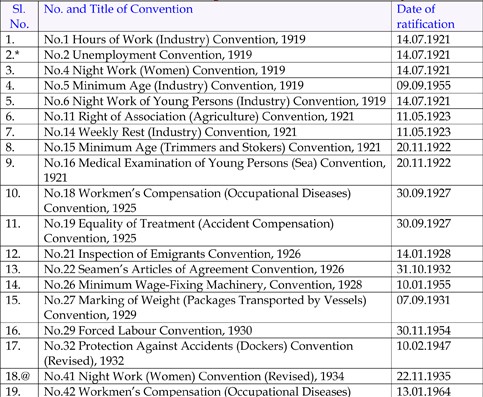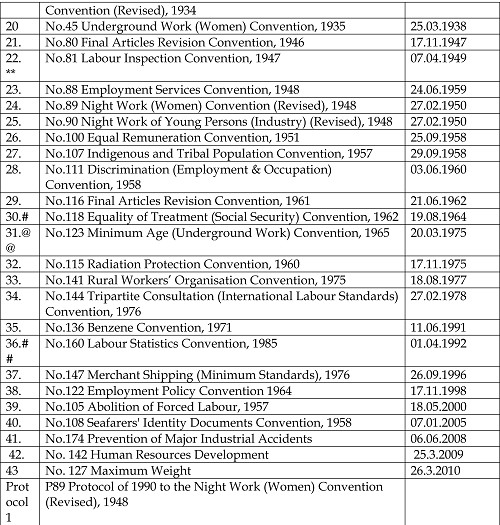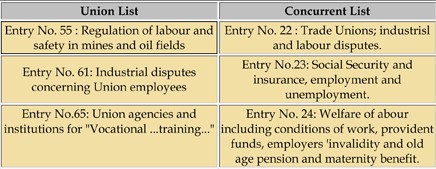Introduction to Labour Law in India
Labour Law is the body of law that governs the employer-employee relationship, including individual employment contracts, the application of tort and contract doctrines, and a large group of statutory regulation on issues such as the right to organize and negotiate collective bargaining agreements, protection from discrimination, wages and hours, and health and safety.
The law relating to labour and employment in India is primarily known under the broad category of "Labour and Industrial Law". The relevance of the dignity of human labour and the need for protecting and safeguarding the interest of labour as human beings has been enshrined in Chapter-III (Articles 16, 19, 23 & 24) and Chapter IV (Articles 39, 41, 42, 43, 43A & 54) of the Constitution of India keeping in line with Fundamental Rights and Directive Principles of State Policy.
Factors responsible for shaping the Indian Labour legislation include:
a. The prevailing social and economic conditions
b. The views expressed by important nationalist leaders during the days of national freedom struggle
c. The provisions of the Constitution
d. The International Conventions and Recommendations.
e. Important human rights and the conventions and standards that have emerged from the United Nations.
f. The deliberations of the various Sessions of the Indian Labour Conference and the International Labour Conference.
g. Recommendations of the various National Committees and Commissions such as First National Commission on Labour (1969) under the Chairmanship of Justice Gajendragadkar, National Commission on Rural Labour (1991), Second National Commission on Labour (2002) under the Chairmanship of Shri Ravindra Varma etc.
h. Judicial pronouncements on labour related matters specifically pertaining to minimum wages, bonded labour, child labour, contract labour etc.
International Labour Organization (ILO)
The International Labour Organization (ILO) is the tripartite UN agency that brings together governments, employers and workers of its member states in common action to promote decent work throughout the world. India is a founder member of the International Labour Organization.
The International Labour Office is headed by a Director-General appointed by the Governing Body. ILO Headquarters are located in Geneva, Switzerland The ILO was founded in 1919. The ILO emerged with the League of Nations from the Treaty of Versailles in 1919. It was founded to give expression to the growing concern for social reform after World War I, and the conviction that any reform had to be conducted at an international level.
After World War II, a dynamic restatement and enlargement of the ILO’s basic goals and principles was made in the Declaration of Philadelphia. The Declaration anticipated postwar growth in national independence, and heralded the birth of large-scale technical cooperation with the developing world. In 1946, the ILO became the first specialized agency associated with the newly formed United Nations Organization.
Structure and working:
The ILO has a tripartite structure unique in the United Nations. The ILO accomplishes its work through three main bodies, all of which comprise government, employer and worker representatives.
1. International Labour Conference: The member States of the ILO meet at the International Labour Conference in June of each year, in Geneva. Two government delegates, an employer delegate and a worker delegate represent each Member State.
2. The Governing Body: The Governing Body is the executive council of the ILO and meets three times a year in Geneva. It takes decisions on ILO policy and establishes the programme and the budget, which it then submits to the Conference for adoption. It also elects the Director-General. The ILO Governing Body is composed of 28 government members, 14 employer members and 14 worker members.
3. The International Labour Office: The International Labour Office is the permanent secretariat of the International Labour Organization. It is the focal point for ILO's overall activities, which it prepares under the scrutiny of the Governing Body and under the leadership of a Director-General, who is elected for a five-year renewable term. Objectives:
The ILO has four principal strategic objectives:
• To promote and realize standards, and fundamental principles and rights at work.
• To create greater opportunities for women and men to secure decent employment.
• To enhance the coverage and effectiveness of social protection for all.
• To strengthen tripartism and social dialogue.
ILO Conventions and Recommendations:
One of the ILO’s original and most important functions is the adoption by the tripartite International Labour Conference (employers, workers and governments) of Conventions and Recommendations which set international standards. Through ratifications by member States, these Conventions create binding obligations to implement their provisions. Recommendations provide guidance on policy, legislation, and practice.
Key ILO Conventions:
1. No. 29
Forced Labour Convention (1930)
Requires the suppression of forced or compulsory labour in all its forms. Certain exceptions are permitted, such as military service, properly supervised convict labour, and emergencies such as wars, fires, earthquakes.
2. No. 87
Freedom of Association and Protection of the Right to Organize Convention (1948)
Establishes the right of all workers and employers to form and join organizations of their own choosing without prior authorization, and lays down a series of guarantees for the free functioning of organizations without interference by public authorities.
3. No. 98
Right to Organize and Collective Bargaining Convention (1949)
Provides for protection against anti-union discrimination, for protection of workers’ and employers’ organizations against acts of interference by each other, and for measures to promote collective bargaining.
3. No. 100
Equal Remuneration Convention (1951)
Calls for equal pay and benefits for men and women for work of equal value.
4. No. 105
Abolition of Forced Labour Convention (1957)
Prohibits the use of any form of forced or compulsory labour as a means of political coercion or education, punishment for the expression of political or ideological views, workforce mobilization, labour discipline, punishment for participation in strikes, or discrimination.
5. No. 111
Discrimination (Employment and Occupation) Convention (1958)
Calls for a national policy to eliminate discrimination in access to employment, training, and working conditions, on grounds of race, colour, sex, religion, political opinion, national extraction or social origin, and to promote equality of opportunity and treatment.
6. No. 138
Minimum Age Convention (1973)
Aims at the abolition of child labour, stipulating that the minimum age for admission to employment shall not be less than the age of completion of compulsory schooling.
7. No. 182
Worst Forms of Child Labour Convention (1999)
Calls for immediate and effective measures to secure the prohibition and elimination of the worst forms of child labour which include slavery and similar practices, forced recruitment for use in armed conflict, use in prostitution and pornography, any illicit activity, as well as work which is likely to harm the health, safety, and morals of children.
List of International Labour Organisation Conventions Ratified by India:


* Later denounced, The Convention requires, internal furnishing of statistics concerning unemployment every three months which is considered not practicable.
@ Convention denounced as a result of ratification of Convention No.89.
** Excluding Part II.
# Branches (c) and (g) and Branches (a) to (c) and (i).
@@ Minimum Age initially specified was 16 years but was raised to 18 years in 1989.
## Article 8 of Part – II.
Constitutional Provisions on Labour
Under the Constitution of India, Labour is a subject in the Concurrent List where both the Central & State Governments are competent to enact legislation subject to certain matters being reserved for the Centre.
Labour Jurisdiction: Constitutional Status:

Ministry of Labour and Employment, Government of India
http://labour.nic.in/welcome.html
Ministry of Labour and Employment of the Government of India is the nodal
Ministry for Labour in India. It is comprised of the following:
Main Secretariat
• Social Security Division
o Social Security - A Profile
o Employee Provident fund Organisation
o Employee State Insurance Corporation
o THE UNORGANISED SECTOR WORKERS’ SOCIAL SECURITY SCHEME
o SALIENT FEATURE OF THE ABOVE SCHEME
• Industrial Relations
• Child and Women Labour
• Directorate General, Labour Welfare
o THE UNORGANISED SECTOR WORKERS’ SOCIAL SECURITY SCHEME
o SALIENT FEATURE OF THE ABOVE SCHEME
• Economic and Statistics Division
- Wage Cell
- Wage Board
- Planning Unit
• International Labour Affairs
• Labour Conference
Attached Offices
• Office of the Chief Labour Commissioner ( Central), New Delhi
• Directorate General, Employment and Training, New Delhi
• Labour Bureau, Simla
• Directorate General,Factory Advice Service and Labour Institutes, Bombay
Subordinate Offices
• Directorate General, Mines Safety, Dhanbad
• Office of the Welfare Commissioner, Allahabad, Bangalore, Bhubaneshwar, Calcutta, Hyderabad, Jabalpur, Karma (Bihar) and Nagpur
Adjudicating Bodies
• Central Government Industrial Tribunal-cum-Labour Court No.1 Dhanbad(Bihar) and No.1Mumbai and at Asansol, Calcutta, Jabalpur, New Delhi, Chandigarh, Kanpur, and Banglore
Arbitration Bodies
• Board of Arbitration (JCM), New Delhi
Autonomous Organizations
• Employees' State Insurance Corporation, New Delhi
• Employees' Provident Fund Organisation, New Delhi
• V.V.Giri National Labour Institute, NOIDA, (U.P)
• Central Board for Workers' Education, Nagpur
Labour Legislations in India
Labour Laws may be classified under the following heads:
I. Laws related to Industrial Relations such as:
1. Trade Unions Act, 1926
2. Industrial Employment Standing Order Act, 1946.
3. Industrial Disputes Act, 1947.
II. Laws related to Wages such as:
4. Payment of Wages Act, 1936
5. Minimum Wages Act, 1948
6. Payment of Bonus Act, 1965.
7. Working Journalists (Fixation of Rates of Wages Act, 1958
III. Laws related to Working Hours, Conditions of Service and Employment such as:
8. Factories Act, 1948.
9. Plantation Labour Act, 1951.
10. Mines Act, 1952.
11. Working Journalists and other Newspaper Employees’ (Conditions of Service and Misc. Provisions) Act, 1955.
12. Merchant Shipping Act, 1958.
13. Motor Transport Workers Act, 1961.
14. Beedi & Cigar Workers (Conditions of Employment) Act, 1966.
15. Contract Labour (Regulation & Abolition) Act, 1970.
16. Sales Promotion Employees Act, 1976.
17. Inter-State Migrant Workmen (Regulation of Employment and Conditions of Service) Act, 1979.
18. Dock Workers (Safety, Health & Welfare) Act, 1986.
19. Building & Other Construction Workers (Regulation of Employment & Conditions of Service) Act, 1996.
20. Building and Other Construction Workers Welfare Cess Act, 1996
21. Cine-Workers and Cinema Theatre Workers (Regulation of Employment) Act, 1981
22. Dangerous Machines (Regulation) Act, 1983
23. Dock Workers (Regulation of Employment) Act, 1948
24. Dock Workers (Regulation of Employment) (Inapplicability to Major Ports) Act, 1997
25. Employment of Manual Scavengers and Construction of Dry Latrines (Prohibition) Act, 1993
26. Industrial Employment (Standing Orders) Act, 1946
27. Mines and Mineral (Development and Regulation Act, 1957
28. Plantation Labour Act, 1951
29. Private Security Agencies (Regulation) Act, 2005
IV. Laws related to Equality and Empowerment of Women such as:
30. Maternity Benefit Act, 1961
31. Equal Remuneration Act, 1976.
V. Laws related to Deprived and Disadvantaged Sections of the Society such as:
32. Bonded Labour System (Abolition) Act, 1976
33. Child Labour (Prohibition & Regulation) Act, 1986
34. Children (Pledging of Labour) Act, 1933
VI. Laws related to Social Security such as:
35. Workmen’s Compensation Act, 1923.
36. Employees’ State Insurance Act, 1948.
37. Employees’ Provident Fund & Miscellaneous Provisions Act, 1952.
38. Payment of Gratuity Act, 1972.
39. Employers’ Liability Act, 1938
40. Beedi Workers Welfare Cess Act, 1976
41. Beedi Workers Welfare Fund Act, 1976
42. Cine workers Welfare Cess Act, 1981
43. Cine Workers Welfare Fund Act, 1981
44. Fatal Accidents Act, 1855
45. Iron Ore Mines, Manganese Ore Mines and Chrome Ore Mines Labour Welfare Cess Act, 1976
46. Iron Ore Mines, Manganese Ore Mines and Chrome Ore Mines Labour Welfare Fund Act, 1976
47. Limestone and Dolomite Mines Labour Welfare Fund Act, 1972
48. Mica Mines Labour Welfare Fund Act, 1946
49. Personal Injuries (Compensation Insurance) Act, 1963
50. Personal Injuries (Emergency Provisions) Act, 1962
51. Unorganised Workers’ Social Security Act, 2008
Labour Policies of the Ministry of Labour and Employment
1. National Policy on HIV AIDS and the World of Work
2. National Policy on Skill Development (March 2009)
3. National Policy on Safety, Health and Environment at Work Place
4. Draft National Employment Policy
5. Draft Protocol on Prevention, Rescue, Repatriation and Rehabilitation of Trafficked and Migrant Child Labour
6. Guidelines to Issuance of Visa for Foreign personnel coming to India for Employment
Professional Opportunities under Labour Laws
There are innumerable legislations on Labour in India. Consultancy may be provided on various matters in relation to these laws e.g –
• Internal Audit
• Registration
• Licenses
• Forms
• Submission of Returns
• Displays required to be made
• Registers to be maintained
• Periodic Information to be filed with the concerned authorities Statutory compliance under various labour laws has to be ensured by establishments. It is not just limited to the statutory deposits, returns and records to be maintained by the employer under various labour laws, but also to represent them in case of prosecution under various statutes. Hence, it hardly needs to be emphasized that the labour related laws cast an obligation for meticulous, impeccable and timely compliances. In the event of violation or delay in complying with the statutory requirements, the consequences in terms of levy of damages, prosecution is inevitable.
Useful Websites
International Labour Organisation
- http://www.ilo.org/global/lang--en/index.htm
Ministry of Labour and employment
- http://www.labour.nic.in/
Labour Bureau
- http://labourbureau.nic.in/
V. V. Giri National Labour Institute
- http://www.vvgnli.org/
Trade Union
- http://www.tradeunionindia.org/
About the Author
Rajkumar S. Adukia
B. Com (Hons.), FCA, ACS, AICWA, LL.B, M.B.A, Dip IFRS (UK), Dip LL & LW
Senior Partner, Adukia & Associates, Chartered Accountants
Meridien Apts, Bldg 1, Office no. 3 to 6
Veera Desai Road, Andheri (West)
Mumbai 400 058
Email rajkumarfca@gmail.com
Join LAWyersClubIndia's network for daily News Updates, Judgment Summaries, Articles, Forum Threads, Online Law Courses, and MUCH MORE!!"
Tags :Labour Service Law












